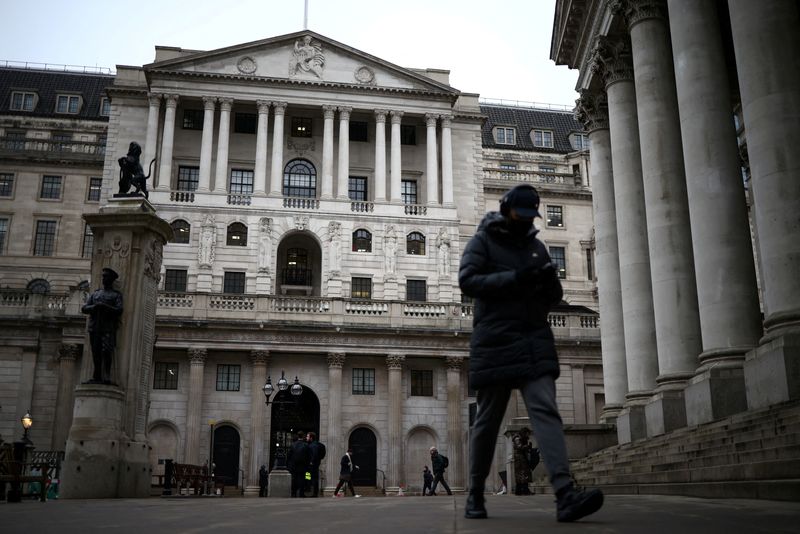By William Schomberg and David Milliken
LONDON (Reuters) - The Bank of England signalled the tide was turning in its battle against high inflation after it raised interest rates on Thursday for the 10th meeting in a row, prompting investors to prepare for the end of its run of higher borrowing costs.
The BoE's interest rate setters voted 7-2 to push Bank Rate to 4.0% - its highest since 2008 - from 3.5%. The move had been expected by most investors and economists polled by Reuters.
Like other central banks such as the U.S. Federal Reserve and the European Central Bank, which raised rates on Wednesday and Thursday respectively, the BoE is trying to smother the risks from an inflation rate that is way above its target.
But it is also worried about aggravating what is expected to be the worst recession among big rich economies this year.
It said its rate hikes going back to December 2021 were likely to become an increasing drag on the economy, helping to bring inflation down to about 4% by the end of this year. Previously the BoE had forecast 2023 inflation at around 5%.
"We've seen the first signs that inflation has turned the corner," Governor Andrew Bailey told reporters after the rate hike. "But it's too soon to declare victory just yet, inflationary pressures are still there."
The Monetary Policy Committee (MPC) would need to be "absolutely sure" that inflation was receding, he said.
The MPC said further interest rate hikes would hinge on evidence of more persistent price pressures.
Previously the BoE had said it would "respond forcefully, as necessary" to signs of further inflation pressure, and that "further increases in Bank Rate may be required".
Investors now think the BoE will raise rates once more, to 4.25% in March, and then keep rates steady, in contrast to expectations before the meeting that it would probably raise rates twice more this year to reach 4.5% by June.
Sterling fell sharply against the U.S. dollar while British government bonds chalked up their biggest daily gains since October.
Bailey said labour market data would be key for understanding how quickly inflation falls. Current pay settlements giving average raises of 6% were a concern, but there were signs that they would fall later this year.
Alexander Batten, a bond portfolio manager with Columbia Threadneedle Investments, said recent data suggested that a sharp weakening of the labour market was coming "but we suspect this may not come soon enough to prevent one final 25 basis-point hike in March".
Martin Beck, an economist with forecasters the EY ITEM Club, said the peak in Bank Rate had probably now been reached given the weak outlook for the economy, and rate cuts could occur by the end of the year.
The BoE's announcement came a day after the U.S. Federal Reserve slowed the pace of its rate hikes with a quarter-point move but said it expected further increases would be needed. The European Central Bank raised rates by a half a percentage point on Thursday to 2.5% and signalled at least one more increase.
The BoE was less clear about its intentions. It said inflation would fall from above 10% now to below its 2% target in just over a year's time.
But it also warned that the risk that inflation could overshoot its forecasts was the biggest since the MPC was formed in 1997 because of persistent labour market pressures and higher-than-expected core and domestically generated inflation.
BoE Deputy Governor Ben Broadbent stressed to reporters that while Britain appeared to have turned a corner on inflation, that was not a comment about Bank Rate hitting its peak.
SHALLOWER RECESSION
The BoE said Britain remained set for a recession but it was likely to be "much shallower" than previously feared due mostly to lower energy prices and weaker market interest rate expectations.
The economy was now seen contracting by 0.5% in 2023 compared with the 1.5% shrinkage forecast in November.
Britain's economy was forecast to shrink by 0.1% during the current quarter, starting a recession which would last five quarters - rather than eight forecast in November - and reducing economic output by a modest 1%.
The BoE saw output still shrinking in 2024 and barely growing in 2025.
Finance minister Jeremy Hunt has promised measures to revive growth in a budget on March 15, ahead of a national election expected next year.
Responding to the BoE decision, Hunt said he would ensure budget measures did not delay the fall in inflation.
The International Monetary Fund this week said Britain's economy would shrink by 0.6% this year while all the other Group of Seven nations were likely to grow.
Britain has been hit hard by the energy price surge after Russia's invasion of Ukraine as it relies heavily on gas for power generation.
It has also suffered a fall in the size of its workforce after the pandemic and post-Brexit restrictions on European Union workers. Unlike other countries, that fall in so-called labour market activity has not yet reversed in Britain.
The BoE said Britain's lack of workers, combined with low business investment and weak productivity growth, meant the economy could probably only grow by about 0.7% a year in 2024 and 2025 without generating inflationary heat.

Before the pandemic, the potential growth rate was about 1.7%.
The BoE saw Britain's economy still below its pre-pandemic size until after 2025, representing seven lost years for growth.